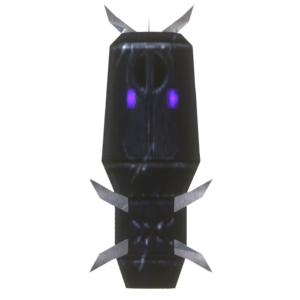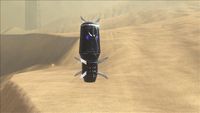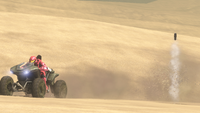Jumpmine
From Halopedia, the Halo wiki
| Jumpmine | |
|---|---|

| |
| Production overview | |
|
Manufacturer: |
Sacred Promissory (presumably)[Note 1] |
|
Type: |
|
| Service history | |
|
In service: |
|
The "jumpmine" is a Covenant spike explosive mine manufactured by the Sacred Promissory.[1][Note 2]
Overview
Design details
The jumpmine is a bounding mine designed to explode above a target. Its overall design resembles the Jovokada Workshop spike grenade, with spikes protrusions on its tip and body. Buried in vast minefields composed of hundreds of individual devices, these explosives are used to protect specific locations from troop movements. When an individual trespass this border up to a certain length, these mines will automatically eject themselves from their buried position, rising vertically about two to three meters above the ground, and detonate. As such, they can shower intruders—infantry or vehicles—with explosive debris. The mines are less effective against aerial targets, because they can only reach and explode on a relatively short height above the ground.[1]
Operational history
At some point, Jiralhanae occupiers seized control of some nondescript Forerunner ruins on Installation 00, and planted these mines in the desert around the ruins to keep potential intruders out. The minefield, however, proved to be ineffective at keeping the UNSC forces of the UNSC Aegis Fate out of the area.[1]
Gameplay
The jumpmines appear exclusively in the Halo 3 multiplayer map Sandtrap. If players attempt to leave the map boundary set by the blinking lights at the edge of the play area, the jumpmines eject from the ground and detonate. Similar to the Shuku-pattern sentry turret in Snowbound, the mines can injure players even when they are inside a bubble shield, or behind a deployable cover; even players under the effects of invincibility enabled by game settings would be killed in the explosions. If a player is killed by one of the mines, the kill will be credited to the Guardians. Overloading the map will remove the jumpmines from the match and prevent them from spawning by the player.[1]
Production notes
- The jumpmine is likely based on the WWII-era S-mine, more commonly known as the "Bouncing Betty".
- The jumpmine shares model and shader data with the Jovokada Workshop spike grenade. Superficially, the jumpmine appears to be a spike grenade without a handle and the tactile spike protrusions around the top.
- Multiplayer Design Lead Tyson Green pursued the use of jumpmines in Sandtrap. According to environmental artist Justin Hayward, the jumpmine was a test of a system to prevent players from leaving the area, the other idea being the shrine defenders, which fire lasers at players that leave the play area. During development, the team tested both jumpmines and shrine defenders. Ultimately, the jumpmines were an ineffective barrier; they took too long to detonate and players can outrun their explosions. However, the team was unable to replace the jumpmines on Sandtrap with shrine defenders before the game shipped. The shrine defenders would later fulfil the same role in Sandbox from the Mythic Map Pack.[2]
Gallery
List of appearances
- Halo 3 (First appearance)
Notes
- ^ Given the jumpmine reuses model and shader data from the Sacred Promissory variant of the Jiralhanae's Jovokada Workshop spike grenade (
claymore_grenadein Halo 3 game files), as well as the Sandtrap map description stating that the location was at one point occupied by Jiralhanae, it could be reasonably inferred to be a spike explosive of Jiralhanae origin that is also manufactured by the Covenant's Sacred Promissory. - ^ While never officially named, the explosive is named as
jumpminein Halo 3 game files. Should an official name be provided, this article should be updated accordingly.
Sources
| ||||||||||||||||||||

